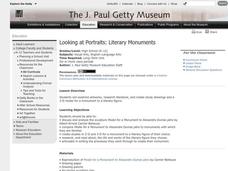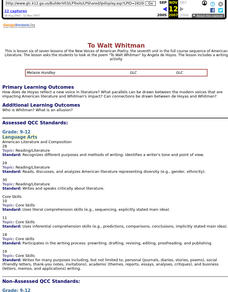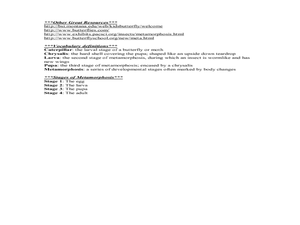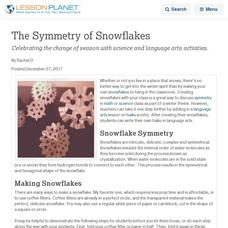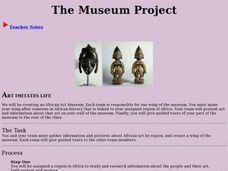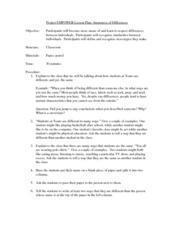We are Teachers
What Goes Up Must Come Down
From understanding stock market performance and return on investment to identifying the costs and benefits of credit and avoiding debt problems, this is an absolute must-have resource for financial planning and literacy.
Los Angeles County Office of Education
Assessment For The California Mathematics Standards Grade 6
Test your scholars' knowledge of a multitude of concepts with an assessment aligned to the California math standards. Using the exam, class members show what they know about the four operations, positive and negative numbers, statistics...
Curated OER
Looking at Portraits: Literary Monuments
Examine artwork, research literature, and create art pieces for a monument to a literary figure. Young scholars analyze the sculpture Model for a Monument to Alexandre Dumas père and compare it to other well-known monuments. They...
Curated OER
To Walt Whitman
High schoolers examine the poem To Walt Whitman by Angela de Hoyos. They divide into groups. Each group creates a poem written from one of two perspectives: to Walt Whitman or to de Hoyos from Whitman.
Novelinks
Where the Red Fern Grows: Anticipation Guide Strategy
How do you rise above your challenges? This is a question the anticipation guide for Where the Red Fern Grows answers. Full of questions and direct statements about themes of the text, pupils investigate whether or not the writer would...
Curated OER
Life Cycle of the Monarch Butterfly
Third graders access prior knowledge of the monarch butterfly and discuss what they would like to know. In this Monarch Butterfly lesson,students read Monarch Butterfly and discuss the life cycle of the butterfly. Students gather...
Curated OER
The Symmetry of Snowflakes
Celebrating the change of season with science and language arts activities.
Curated OER
The Museum Project
Students create an African Art Museum. Each group present art and information about that art on your wall of the museum.
Curated OER
The Structure of DNA
Students describe the structure of the double helix, explain how DNA copies itself, and recognize that the sequence of DNA is what makes each individual unique.
Curated OER
Communities
Young scholars are introduced to the concept of communities. Using a map, they locate and describe different communities of all sizes. They watch a video and answer questions on a worksheet to complete the lesson.
Curated OER
Student Book Reviews/ The Outsiders
Eighth graders participate in a lesson that focuses on the devleopment of reading skills looking for critical elements. They compose a book review for "The Outsiders" after reading previous reviews. Students also access the web in order...
Curated OER
ReQuest and Motor Imaging with My Side of the Mountain
Fifth graders read "My Side of the Mountain." They create a pantomime using vocabulary words from the story. Students create three questions about the reading. They discuss the passage they read and act out words to help them better...
Curated OER
Sensory Competition
Students explore examining something through one sense but experience competing input with another. The lesson also shows the plasticity of the brain and other cognitive functions.
Curated OER
Goal Setting
Students participate in a lesson that focuses on the skill of setting a goal. They practice the setting of a specific goal that can be measured and achievable given the right resources. Students generate a list of goals while going...
Curated OER
Funky Illuminated Fairy Tales
Pupils create a nameplate and an original fairy tale book using an illuminated manuscript format. They create a personal nameplate using a decorated or historiated initial, a border, and illuminations.
Curated OER
Looking At Portraits: Literary Monuments
Young scholars examine artworks, research literature, and create study drawings and a 3-D model for a monument to a literary figure. They discuss and analyze the sculpture Model for a Monument to Alexandre Dumas p??re by Albert-Ernest...
Curated OER
Who Will Benefit if We Give Bulbs What They Need to Grow?
Students identify the elements needed for bulbs to grow. They raise tulips and give them to various members of the community. They identify local philanthropic communities and look for ways they can constructively donate time and give...
Curated OER
A Design for a Fireplace: Extreme Home Makeover
Students examine a relief structure focusing on style, relief, and design. Students discuss and analyze the sculpture Sketch for a Fireplace Overmantel by Francesco Antonio Franzoni. Students brainstorm about the current styles of home...
Curated OER
Looking at Portraits: Literary Monuments
Students examine artworks, research literature, create drawings, and make a 3-D model for a monument to a literary figure. In this literary portrait lesson, students discuss and analyze the sculpture Study of a Monument to Alexandre...
Curated OER
A Design for a Fireplace
Students examine a relief sculpture. In this sculpting lesson, students analyze the sculpture "Sketch for a Fireplace Overmantel" by Francesco Franzoni. Students create a three-dimensional sketch for an overmantel using the styles of...
Curated OER
Project EMPOWER: Awareness of Differences
Students explore the differences of others. They examine ways in which they can respect the differences between individuals. Students explore the ways in which people are similar and they recognize stereotypes they make.




